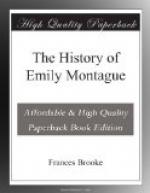I am interrupted.
Adieu! Yours,
Emily
Montague.
LETTER 182.
To Mrs. Temple.
Rose-hill, Sept. 18, Morning.
I have this moment, my dear Mrs. Temple’s letter: she will imagine my transport at the happy event she mentions; my dear Rivers has, in some degree, sacrificed even filial affection to his tenderness for me; the consciousness of this has ever cast a damp on the pleasure I should otherwise have felt, at the prospect of spending my life with the most excellent of mankind: I shall now be his, without the painful reflection of having lessened the enjoyments of the best parent that ever existed.
I should be blest indeed, my amiable friend, if I did not suffer from my too anxious tenderness; I dread the possibility of my becoming in time less dear to your brother; I love him to such excess that I could not survive the loss of his affection.
There is no distress, no want, I could not bear with delight for him; but if I lose his heart, I lose all for which life is worth keeping.
Could I bear to see those looks of ardent love converted into the cold glances of indifference!
You will, my dearest friend, pity a heart, whose too great sensibility wounds itself: why should I fear? was ever tenderness equal to that of my Rivers? can a heart like his change from caprice? It shall be the business of my life to merit his tenderness.
I will not give way to fears which injure him, and, indulged, would destroy all my happiness.
I expect Mr. and Mrs. Fitzgerald every moment. Adieu!
Your affectionate
Emily
Montague.
LETTER 183.
To Captain Fitzgerald.
Bellfield, Sept. 17.
You say true, my dear Fitzgerald: friendship, like love, is more the child of sympathy than of reason; though inspired by qualities very opposite to those which give love, it strikes like that in a moment: like that, it is free as air, and, when constrained, loses all its spirit.
In both, from some nameless cause, at least some cause to us incomprehensible, the affections take fire the instant two persons, whose minds are in unison, observe each other, which, however, they may often meet without doing.
It is therefore as impossible for others to point out objects of our friendship as love; our choice must be uninfluenced, if we wish to find happiness in either.
Cold, lifeless esteem may grow from a long tasteless acquaintance; but real affection makes a sudden and lively impression.
This impression is improved, is strengthened by time, and a more intimate knowledge of the merit of the person who makes it; but it is, it must be, spontaneous, or be nothing.
I felt this sympathy powerfully in regard to yourself; I had the strongest partiality for you before I knew how very worthy you were of my esteem.




